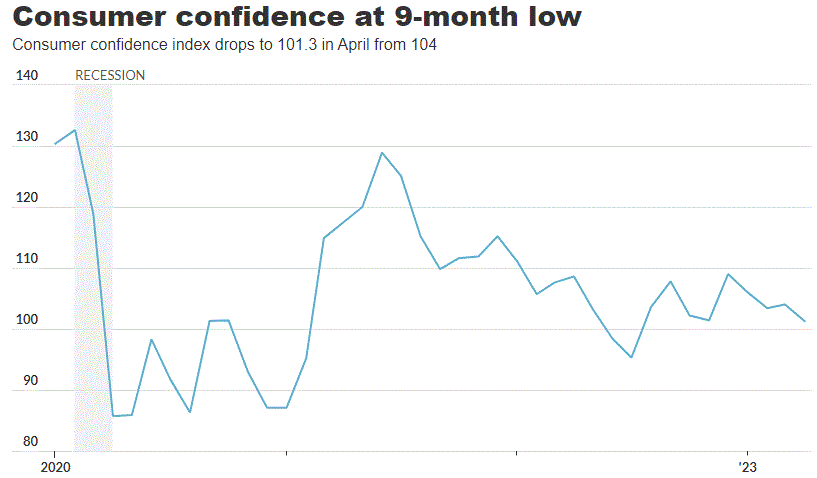MarketWatch
The numbers: A survey of consumer confidence fell in April to a nine-month low of 101.3, reflecting nagging worries about a possible U.S. recession and a softening labor market.
The closely followed index dropped 2.7 points from a revised 104 in the prior month, the Conference Board said Tuesday. The level of confidence in April was the lowest since July 2022.
Consumer confidence tends to signal whether the economy is getting better or worse. The index remains well below the levels associated with a healthy economy.
Economists polled by The Wall Street Journal had forecast the index to register 104.
Key details: Americans are more worried about the future. A confidence gauge that looks ahead six months tumbled to 68.1 in April from 74 — also a nine-month low.
Constant readings below 80 often signal a recession within the next year, the board has said. The expectations index has been below that level in every month except for one in the last 14 months.
Younger Americans and households earning $50,000 or over were the most pessimistic.
“Purchasing plans for homes, autos, appliances, and vacations all pulled back in April, a signal that consumers may be economizing amid growing pessimism,” said Ataman Ozyildirim, senior director of economics at the board.
A measure that looks at how consumers feel about the economy right now, however, actually rose to a two-month high of 151.1 from 148.9.
The consumer-confidence survey puts a lot of weight on Americans’ view of the labor market. Many companies are still hiring and the unemployment rate is near a 54-year low, but layoffs have been rising and job openings have declined.
Inflation expectations did not change much. Americans expect prices to rise 6.2% in the next 12 months.
Expectations for inflation had peaked at 7.9% last summer.
Looking ahead: “Consumers became more pessimistic about the outlook for both business conditions and labor markets,” Ozyildirim said.. “Fewer households expect business conditions to improve and more expect worsening of conditions in the next six months.”
Big picture: The U.S. economy grew at a stronger pace than expected in the first quarter of 2023, a period running from January to March. Forecasters polled by The Wall Street Journal predict gross domestic product expanded at a 2% annual rate.
Yet the economy is unlikely to repeat that performance in the spring. Rising interest rates and still-high inflation have pinched growth and a red-hot labor market appears to be cooling a bit.
Many economists think a recession is not far away, a view apparently shared by many Americans given the low level of confidence.














